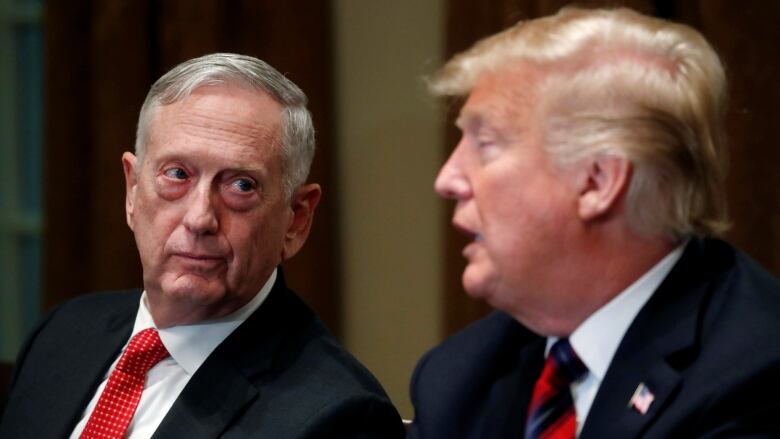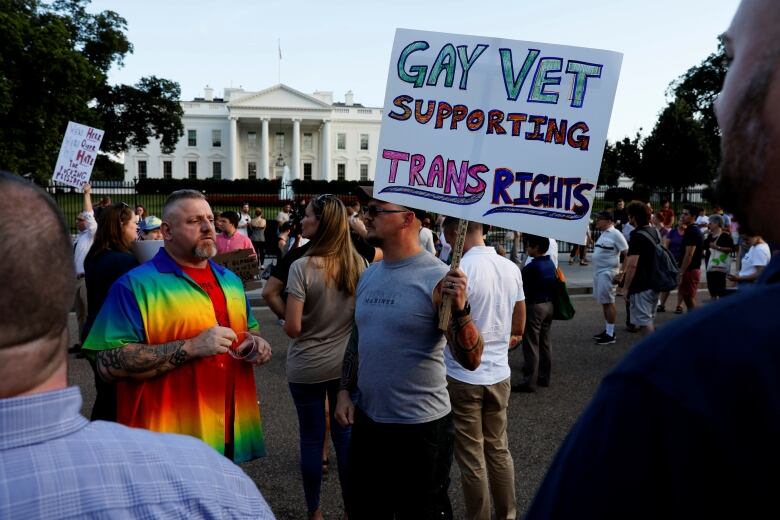Trump administration asks Supreme Court to consider its transgender military ban
Lower courts had yet to make a ruling in cases brought since Trump first expressed desire for a ban

The Trump administration is asking the U.S. Supreme Court to fast-track cases on the president's decision to prevent certain transgender people from serving in the military.
The administration asked the court on Friday to take up three cases on the issue. Lower courts had blocked the administration from implementing the policy.
A three-judge panel of the 9th U.S. Circuit Court of Appeals heard arguments in one of the cases in October but hasn't ruled. The D.C. Court of Appeals is set to hear arguments in another case on Dec. 10.
The administration had warned that it would ask the high court to step in if the appeals court didn't rule before Friday. The administration wants the Supreme Court to be able to rule on the issue before the summer.
The justices don't typically take cases before federal appeals courts rule on them.
Trump has frequently lashed out at decisions from the 9th Circuit on social media and in interviews, though some legal analysts have said he has often distorted or confused the nature of its rulings.

The Pentagon ended its ban on openly transgender people serving in the U.S. military in 2016 during the Obamaadministration. At the time, Defence Secretary Ash Carter cited a Rand Corporation study that estimated there were about were about 2,500 active-duty service members who were transgender.
The think-tank, citing an international survey, concluded there would be "little or no impact on unit cohesion, operational effectiveness, or readiness, of transgender individuals serving openly in the military." It was estimated there would be between 40 and 200 transition-related surgeries annually in the U.S. military.
'Foreign militaries'
Canada is one of several countries that currently allow transgender military personnel, a list that also includes Israel, Australia, Britain, Germany and France.
Trump in July 2017 announced on social media, reportedly to the surprise of many Pentagon officials, that his administration would reverse the Obama policy and bar transgender people from military service "in any capacity." A month later, the White House said it was instructing Defence Secretary James Mattis to implement the policy.
Four lawsuits challenging the Trump administration plan quickly followed.
In March, Mattis delivered his report, in which he stated "this policy issue has proven more complex than the prior administration or Rand assumed," and that the latter's study relied too heavily on "foreign militaries with different operational requirements than our own."
Mattis recommended transgender persons with a history or diagnosis of gender dysphoria, or those who require or had undergone gender transition, be generally disqualified from military service going forward.
The report stressed that transgender persons outside those definitions would able to serve "in their biological sex."
It was recommended that those currently serving could, generally speaking, "continue to serve in their preferred gender and receive medically necessary treatment for gender dysphoria."
Canada's military policy for transgender personnel first came into effect in 2012, though the Canadian Forces do not appear to track the number currently serving.
A National Defence spokesperson last year said that, through 2015, the military has paid for 19 sex-reassignment at a total cost of around $309,000.
With files from CBC News and The Canadian Press












_(720p).jpg)


 OFFICIAL HD MUSIC VIDEO.jpg)
.jpg)



























































































